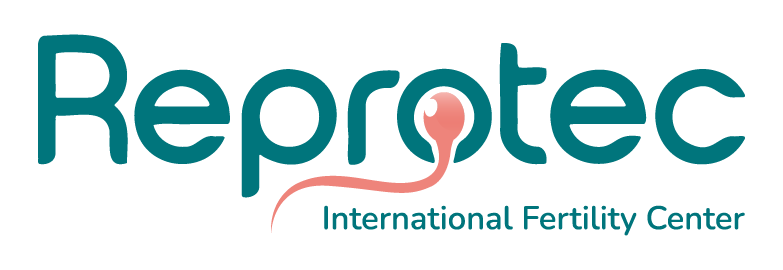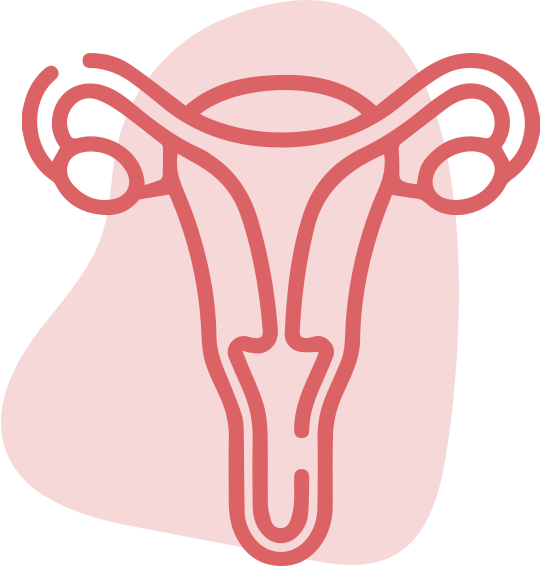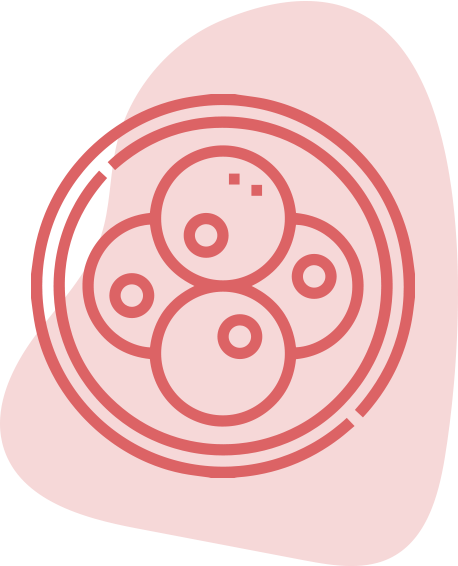Treatment options
Treatment options
Fertility
Preservation
Ovulation induction
Intrauterine
insemination (IUI)
In Vitro Fertilization (IVF)
Even though it is the most widely known assisted reproductive treatment, it is not always indicated as the first-line treatment in all cases. Most of the time, it is used for the treatment of infertile women with blocked fallopian tubes, severe or advanced endometriosis, advanced reproductive age, ovulatory disorders like polycystic ovary syndrome, in which other treatment options have failed, as well as in cases of premature ovarian insufficiency.
In infertile men, it is mostly used in cases of severe alterations in the number, motility, or morphology of the sperm, and a history of previous vasectomy.
It is also frequently used in single women, same-sex couples, and in cases of unexplained infertility where no obvious cause of infertility is identified during the diagnostic investigation.
IVF is the union of the egg and the sperm outside of the woman’s body, but in the embryology laboratory under special culture conditions that include specialized culture media and controlled temperature, CO2, nitrogen, and oxygen concentrations.
Once fertilization occurs, the embryo development is closely monitored until it reaches the stage to be transferred into the uterus. At REPROTEC Fertility Center, we offer the most advanced techniques of embryo culture and development with embryoscopes that provide real-time monitoring with serial photography and timelapse videos, which allow us to detect abnormal embryos and select the best embryos to increase your chances of a successful pregnancy. We are the only center in Colombia and one of the few in Latin America that offers this timelapse technology.
IVF entails the use of well-monitored and individualized superovulation protocols to stimulate the production of a sufficient number and quality of eggs, which are aspirated from the ovaries under sedation using transvaginal ultrasound, then fertilized in the laboratory.
Intracytoplasmic
Sperm Injection (ICSI)
ICSI is a technique in which a single sperm is injected directly into a mature egg at the embryology laboratory under magnification with an inverted microscope, with the use of a micromanipulator with very fine and sharp micropipettes.
ICSI is mostly used for cases with severe abnormalities in the semen parameters found in more than one third of couples with infertility, including concentration, motility and morphology of the sperm.
Oocyte / Egg Donation
Utilizing an egg donor to achieve a successful pregnancy is a terrific option for many couples, including women with exhausted number of eggs in their ovaries for diverse reasons: either related to advanced reproductive age, or previous surgical or medical treatments that have diminished the egg pool or egg quality. Egg donation is also utilized in women who have genetic diseases that per se decrease the number of eggs in their ovaries, or are carriers of genetic conditions that do not want to inherit to future generations. It also can be offered to couples who have repeatedly failed previous attempts of IVF with their own eggs
This highly effective assisted reproductive technique comprises the selection of a suitable healthy young egg donor who undergoes a very strict selection process that entails detailed medical, gynecological, genetic, laboratory and psychiatric evaluations. Once the donor passes all these exams, she undergoes a cycle of ovarian stimulation to get a sufficient number of eggs at the time of egg retrieval. These are fertilized in the laboratory with the couple’s sperm. Embryo development continues the same way as in a regular IVF cycle. From the embryos obtained, one is subsequently transferred to the uterus of the intended mother that has been previously prepared with estrogen and progesterone, or in many cases with her own natural cycle.
REPROTEC has a very robust egg donation program that follows rigorously all protocols to comply with best international standards.
At REPROTEC you also find an embryo donation program for selected couples who must meet all and everyone of the requirements for this program.
Frozen embryo
transfer (FET)
Same sex female
couples (SSFC)
Assisted reproduction treatments for SSFC are a very fulfilling option for female couples who desire to build a family. One of the most frequent modalities is when one of them undergoes ovarian stimulation to obtain eggs, which are then fertilized in the laboratory with a donor’s sperm. Once the embryos are ready, one of them is transferred to the other female member of the couple, whose uterus has been previously prepared to receive and implant the embryo to carry the pregnancy to term.
Uterine surrogacy
REPROTEC has an extensive experience in uterine surrogacy since it was one of the first fertility centers in Colombia to carry out this highly effective assisted reproductive technique.
There are different indications to carry out this treatment. Among the most frequent are women with congenital absence of the uterus, patients who have undergone through a previous hysterectomy or have congenital and acquired uterine diseases that impede embryo implantation and pregnancy progression. It is also offered to women with medical conditions in which pregnancy is contraindicated due to compromise of her own health or the baby´s.
Likewise, it is a very effective treatment to same sex male couples and single men who want to build a family. REPROTEC is an inclusive space where the very strong and successful uterine surrogacy program is offered in all these situations.
This treatment is carried out in a very solid manner in order to guarantee transparency and effectiveness throughout the process. This includes the evaluation of the woman indented to be the gestational carrier, as well as the legal and psychological counseling requirements for both, the couple and the gestational carrier.



